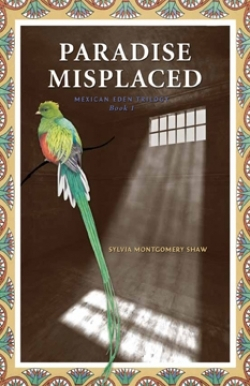Paradise Misplaced
Book I of the Mexican Eden Trilogy
Murder, betrayal, war, and passion are the obvious aspects of Sylvia Montgomery Shaw’s lyrical debut novel, Paradise Misplaced. The first in a trilogy about the once-fabulously wealthy Nyman family starts with the murder of Mexican General Lucio Nyman Berquist and the conviction of his son (after a surprise twist) for the crime.
Carefully and craftily woven in, however, are the stories of transformation that make up the heart of Paradise Misplaced, the transformation of Mexico in the months and weeks before the start of the 1910 revolution and that of Benjamin Nyman Vizcarra, the son who goes to prison for his father’s murder.
Rich and handsome, Benjamin is a military captain who seemingly has it all. But once in prison, he and the reader begin to slowly see him as he really is: lonely, self-serving, arrogant, angry. There, he undergoes a spiritual transformation that eighteenth-century Swedish theologian and philosopher Emanuel Swedenborg called “regeneration,” a two-phase process that includes hearing an inner voice from God that points out weaknesses and faults, and then defying daily temptations to overcome them.
It’s a religious concept Benjamin is familiar with through his wife, Isabel, who much to his mother’s horror is a Swedenborgian and not a Roman Catholic, and that Shaw is familiar with as a Swedenborg scholar. Director of the English program at Bryn Athyn College in Pennsylvania, Shaw has written numerous papers on Swedenborg and his impact on literature, as well as those that explore spirituality and morality, issues that Benjamin also explores.
Although Paradise Misplaced starts in the third person, the majority is written in the first person, from Benjamin’s point of view, when, as Federal Penitentiary prisoner #243, he decides to write his life story so his twin brother Samuel “may learn about life’s foibles from me.”
Through Shaw’s poetic prose and gifted storytelling, Benjamin past and present comes to vivid, unquestionable life. Her use of magic realism, languid prose, and vivid details make delightfully compelling what for other writers could be a plodding narrative, as Benjamin relives his country’s and family’s decline and his unexpected love affair and marriage to Isabel. Especially interesting is when Benjamin meets and befriends fellow prisoner El Brujo, “The Witch Doctor,” a Tarahumara Indian shaman “both youthful and old” who, with the help of a murky, lime-scented elixir, is able to run non-stop around the prison yard, a secret he shares with Benjamin.
Though designed to be only the first part of Bejamin’s and the Nyman family’s story, Paradise Misplaced can stand alone. Through Benjamin, Shaw takes readers into the streets, homes, and minds of those who lived in turbulent twentieth-century Mexico. Like the novel overall, the ending is satisfying, though as Shaw, herself a Mexican-American, teases in an afterward: “the revolution is far from over.”
Reviewed by
Cindy Wolfe Boynton
Disclosure: This article is not an endorsement, but a review. The publisher of this book provided free copies of the book and paid a small fee to have their book reviewed by a professional reviewer. Foreword Reviews and Clarion Reviews make no guarantee that the publisher will receive a positive review. Foreword Magazine, Inc. is disclosing this in accordance with the Federal Trade Commission’s 16 CFR, Part 255.

